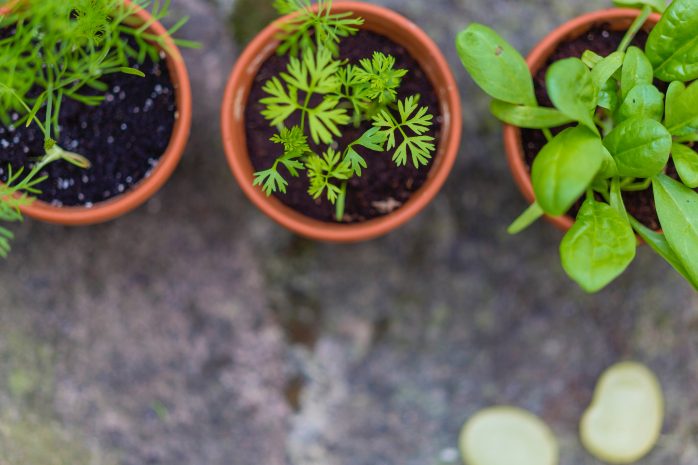
Rabbits are very fragile creatures, but they love food. Especially fruits and vegetables. Whilst a majority of your pet’s diet should be fresh hay, grass, and an unlimited supply of clean water, there are some precautions to take. So, What fruit and veg can I feed my bunny?
If you were to observe a wild rabbit you would notice that they eat a wide variety of fruits and vegetables. This can range from wet and dry grass to a lot of leafy greens which we wouldn’t consider giving our pet rabbits.
Wild rabbits will often eat bark (Especially Willow), twigs, seeds, and more, but this doesn’t mean that this makes for a healthy diet when planning for your house rabbits.
Rabbits’ stomachs can take some time to get used to a new food, much like ourselves too much of a good thing can cause issues. Your rabbit may not get along with some of these foods on this list.
After giving your rabbit some of these foods, we suggest waiting at least 24 hours and keeping an eye on their poo as this will be a good indication of any intolerant digestive issues.
Any sign of soft poo or mushy poo (Except cecotropes) should result in going back to a normal diet.
One common mistake we see on forums and in Facebook groups is that owners don’t wash their rabbit’s foods. If you have fruit or vegetables remember to give everything a wash for at least 20 seconds. Simply run it under cold water and give it a wipe-over to remove any poisonous toxins or chemicals.
Always give your rabbit small portions, no more than 1 cup of vegetables for each 4lbs your rabbit weighs. For example, if your rabbit weighs 8lbs, give them 2 cups of vegetables!

Please note the vegetables and fruit in the lists below were sourced from the RWAF
Note: Do NOT give your rabbit Iceberg Lettuce or Light-colored lead Lettuce. Also, chop your vegetables into chunks but not small enough for your rabbit to choke. Chopping or dicing them into cubes is perfect.
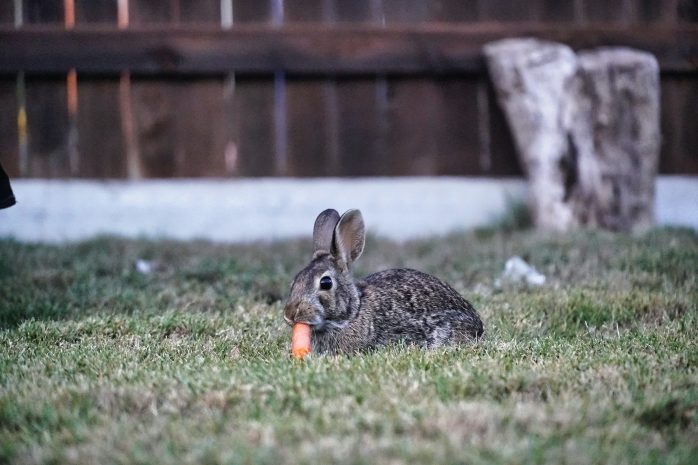
Your baby bunny can eat the same vegetables as its parents did; anything from the list above will be fine in moderation.
In essence, anything is fine in moderation. Some traditional vets will advise that baby rabbits should not be fed fresh food. This is purely due to their sensitive digestive system.
This is an old myth you will likely not find with any newer exotic vet. Any rabbit can eat vegetables if it has time to adjust to its dietary changes.
Baby rabbits in the wild don’t live on pellets, and whilst this shouldn’t be a standard rule for your rabbit, it does apply here. By 4 weeks, your baby rabbit should be able to enjoy small portions of vegetables.
Fruits should be limited due to their high sugar content, which can cause health issues for your rabbit. We highly suggest limiting this to 1-3 tablespoons of fruit daily, but it’s worth checking with your vet in case your rabbit requires a specific dietary restriction.
Note: Do not give your rabbit pips or stones, as these are usually poisonous.
Herbs are potent, so start by giving very small portions. Try mixing these in with your other fruits and veg!

Some wild plants can be hazardous to your little fur friend. This list of poisonous plants has been sourced from various locations and checked with the Rabbit Welfare Association and Fund.
Don’t worry too much if your rabbit is a fussy or picky eater. Some rabbits aren’t that fuss about greens and prefer pellets and hay.
Whilst we do suggest trying to push greens in their direction, not every bun will be happy with this for a multitude of reasons.
For example, exposing your rabbit to vegetables earlier in life instead of being an older adult will make them more likely to try newer vegetables.
We find with our rabbit Link that he quite simply doesn’t like leafy greens, but cucumber is something he loves. Mix it up and see if you can make a mini salad, take note of what’s left over and what isn’t!
If your rabbit has a particularly sweet tooth, try to steer clear of treats for a while, this may point them in the right direction!
Don’t forget that after all these veggies and fruit, hay is still the single most important factor to your rabbit’s diet.
As Rabbits are grazing animals you should constantly give them an unlimited supply of fresh hay, and try not to overfeed their vegetables to the point where they’ll no longer want hay.
You only want to be giving them between 1 to 2 cups of fresh daily vegetables if you can. If they’re a dwarf breed tone this down to just 1 cup a day
There are multiple types of hay out there for different ages and sizes of rabbits, you’ll mostly find good hay to be timothy, orchard grass, oat, and brome hay. If you can, store it somewhere dry and keep it fresh!
If you’re struggling to get your rabbit to eat hay, try toning back on the vegetables and place a few more hay feeders around the house.
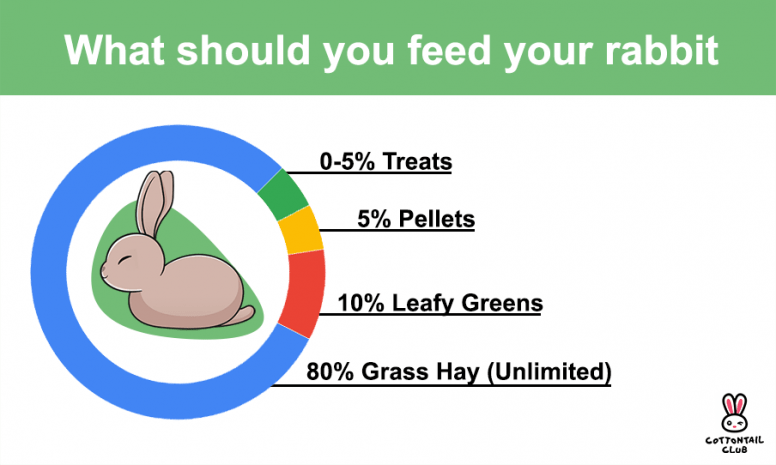
One common mistake we see on forums and in Facebook groups is that owners don’t wash their rabbits foods. If you have fruit or vegetables remember to give everything a wash for at least 20 seconds. Simply run it under cold water and give it a wipe over to remove any poisonous toxins or chemicals.
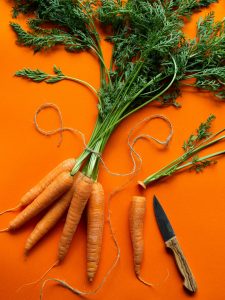 Always give your rabbit small portions, no more than 1 cup of vegetables for each 4lbs your rabbit weighs. For example, if your rabbit weighs 8lbs, give them 2 cups of vegetables!
Always give your rabbit small portions, no more than 1 cup of vegetables for each 4lbs your rabbit weighs. For example, if your rabbit weighs 8lbs, give them 2 cups of vegetables!
Please note the vegetables and fruit in the lists below were sourced from the RWAF

Your baby bunny can eat the same vegetables as their parents did, anything from the list above will be fine in moderation.
In essence, anything is fine in moderation. Some traditional vets will advise that baby rabbits should not be fed any form of fresh food. This is purely due to their sensitive digestive system.
This is an old myth that you are likely not to find with any newer exotic vet. Any rabbit can eat vegetables as long as it has time to adjust to its dietary changes.
Baby rabbits in the wild don’t live on pellets and whilst this shouldn’t be a standard rule for your rabbit, it does apply here. By 4 weeks, your baby rabbit should be able to enjoy small portions of vegetables.
Fruits should be limited due to their high sugar content which can cause health issues for your rabbit. We highly suggest limiting this to 1-3 tablespoons of fruit per day, but it’s worth checking with your vet incase your rabbit requires a specific dietary restriction.
Herbs are potent, so make sure to start by giving very small portions. Try mixing these in with your other fruits and veg!

Some wild plants can be hazardous to your little fur friend, this list of poisonous plants has been sources from various locations and checked with the Rabbit Welfare Association and Fund.
Don’t worry too much if your rabbit is a fussy or picky eater. Some rabbits just aren’t that fussed about greens and much prefer pellets and hay.
Whilst we do suggest really trying to push greens in their direction, not every bun will be happy with this for a multitude of reasons.
For example, exposing your rabbit to vegetables earlier on in their life instead of being an older adult will make them more likely to try newer vegetables.
We find with our rabbit Link that he quite simply doesn’t like leaft greens but cucumber is something he loves. Definitely mix it up and see if you can make a mini salad, take note of what’s left over and what isn’t!
If your rabbit has a particularly sweet tooth, try to steer clear of treats for a while, this may point them in the right direction!
Don’t forget that after all these veggies and fruit that Hay is still the single most important factor to your rabbits diet as it makes up anywhere from 80 to 90 perfect of your rabbits diet.
As Rabbits are grazing animals you should constantly give them an unlimited supply of fresh hay, try not to overfeed them vegetables to the point where they’ll no longer want hay.
You only want to be giving them between 1 to 2 cups of fresh daily vegetables if you can. If they’re a dwarf breed tone this down to just 1 cup a day
There are multiple types of hay out there for different ages and sizes of rabbits, you’ll mostly find good hay to be timothy, orchard grass, oat and brome hay. If you can, store it somewhere dry and keep it fresh!
If you’re struggling to get your rabbit to eat hay, try toning back on the vegetables and place a few more hay feeders around the house.
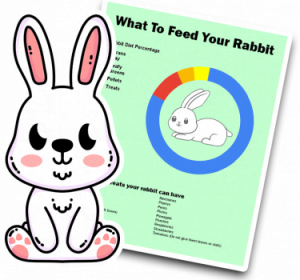
By entering your email address you agree to receive emails from Cottontailclub. We'll respect your privacy and you can unsubscribe at any time.